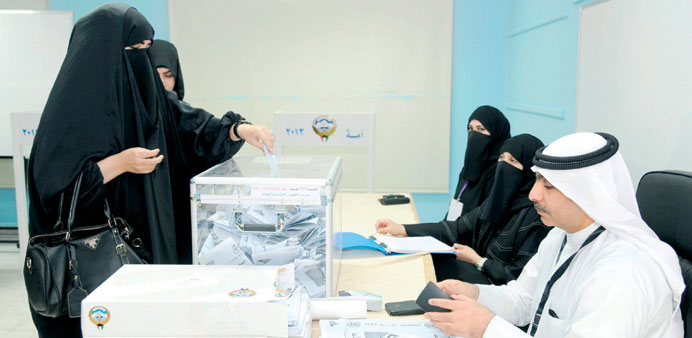AFP/Kuwait
Kuwait yesterday awaited the results of its second parliamentary election in eight months, after day-long voting and early indications showing a higher turnout despite an opposition boycott.
No official figures were released when polling stations closed at 8pm but state-run Kuwait television broadcast partial figures indicating a higher turnout from December’s record-low 40%.
At some of the 100 polling centres, especially in tribal areas which boycotted the previous polls, voting was brisk while the pace was slow elsewhere amid scorching temperatures.
Information Minister Sheikh Salman Humoud al-Sabah said after visiting a polling station earlier in the day in Jahra, west of Kuwait City, that turnout was high.
Besides opposition calls for a boycott, the sweltering heat of around 45 degrees Celsius, combined with the Ramadan fast, also affected turnout.
It was the second time the opposition had called for a boycott in protest at an electoral law that it alleges enables the government to manipulate the outcome.
The law was ruled legal in June by the constitutional court, even though it dissolved parliament on procedural flaws, and ordered yesterday’s election.
“I just hope this parliament completes its (four-year) term,” said civil aviation employee Bassam Eid, after voting in Al Qasia.
“We are frustrated at the repeated dissolution of the house,” Eid said.
The last two parliaments were dissolved by the constitutional court on procedural grounds, while previous parliaments were dissolved by the emir.
“I am really concerned at the turn of events in the country as there will be no development without political stability, which we hope will be achieved after this election,” Dr Jawad Abulhassan said.
Some groups that boycotted the last election—notably the liberal National Democratic Alliance and some of the emirate’s powerful tribes—did take part yesterday.
But only a few opposition members were among the 300 hopeful candidates.
They included eight women, the lowest number since Kuwaiti women won political rights in 2005.
Around 30 Arab election observers visited polling stations and were assisted by monitors from the Kuwait Transparency Society.
The opposition failed to mirror the support it mobilised ahead of the last election, but has remained adamant that it will not take part in a “corrupted” political system.

A woman casts her ballot at a polling station in Kuwait City yesterday.
